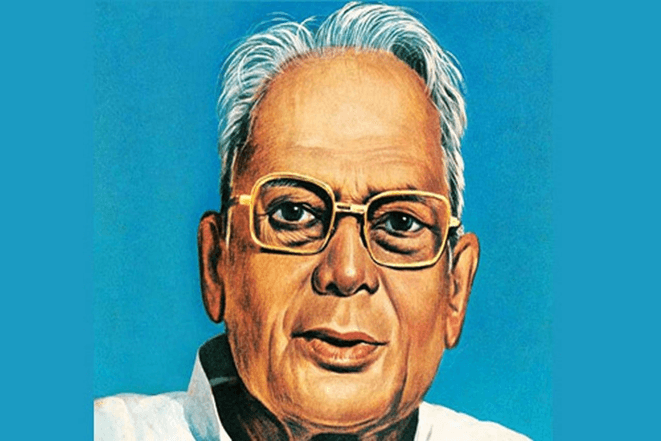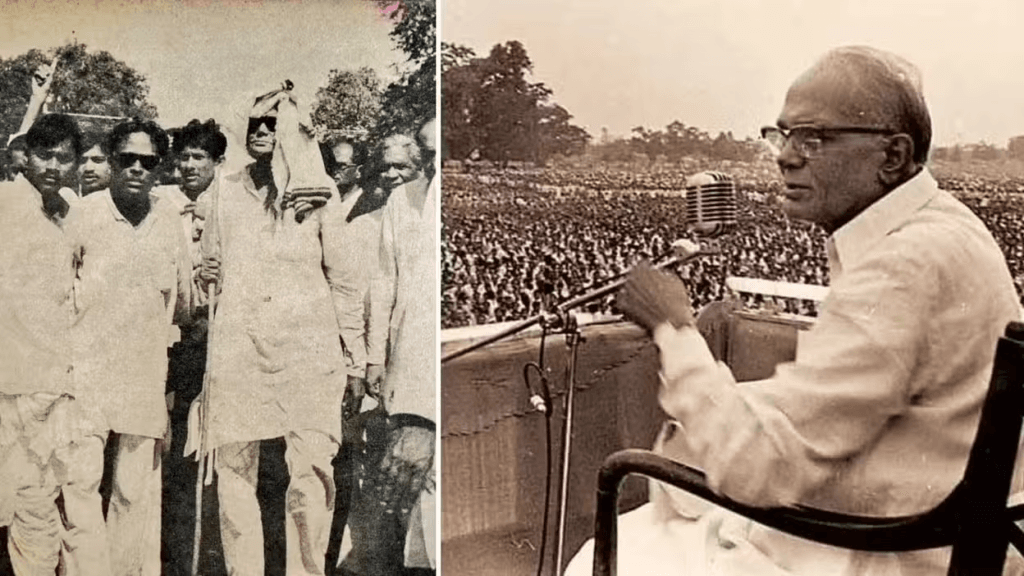Loknayak Jayprakash Narayan

Early Life and Education
Loknayak Jayprakash Narayan, popularly known as JP, was born on 11 October 1902 in a small village called Sitabdiara in Bihar, India. He hailed from a modest family with a strong sense of rural values. JP was deeply influenced by his family’s emphasis on honesty, simplicity, and service to society. He completed his early schooling in local schools before moving to Patna for higher studies. Later, he pursued his education at the University of Allahabad, where he earned a degree in philosophy. His quest for knowledge led him to the United States, where he studied at the University of California, Berkeley, in the early 1920s. It was during this period that he became exposed to the ideas of Mahatma Gandhi, socialism, and the concept of social justice.
Political Awakening and Influence of Gandhi
While studying in the United States, Jayprakash Narayan was deeply influenced by the writings of Mahatma Gandhi and his non-violent approach to independence. Inspired by Gandhi’s ideas, JP returned to India in 1929 and joined the freedom movement. He soon became an active participant in the Indian National Congress and took part in the civil disobedience movement. His political journey began with his involvement in the struggle for India’s independence, where he was inspired by the ideals of social reform, justice, and equality. During the 1930s, he was influenced by the ideals of socialism and began advocating for the socio-economic upliftment of the masses, focusing on the eradication of poverty, illiteracy, and caste discrimination.

Contributions to the Quit India Movement
Jayprakash Narayan’s political activism reached new heights during the Quit India Movement of 1942. He became one of the key leaders in the movement, calling for immediate British withdrawal from India. JP was arrested by the British government and imprisoned for a significant period of time. During his incarceration, his views on social justice and equality evolved further, and he began to believe that political independence was not enough without social and economic reforms. His growing interest in socialist ideas and his vision for an India free from social inequality and exploitation became central themes in his political career. JP became a symbol of resistance, embodying both the spirit of the freedom struggle and the aspiration for a just society.
Post-Independence Struggles and Socialist Vision
After India gained independence in 1947, Jayprakash Narayan became disillusioned with the political landscape. He felt that the new government, despite achieving independence, was failing to address the pressing issues of poverty, corruption, and inequality. In the 1950s and 1960s, JP became more vocal in his criticism of the prevailing political system. He advocated for a new model of governance and urged for the decentralization of power, proposing a more democratic and socialist approach to governance. He believed in empowering local communities and people, especially the rural population, and was critical of both the political class and the bureaucratic elite. His ideas on political reform included the establishment of a “total revolution” (total Kranti), which sought to transform society through social, economic, and political changes.
The Emergency and JP’s Opposition to Indira Gandhi
In the early 1970s, Jayprakash Narayan’s political activism reached its peak as he became one of the leading opponents of Prime Minister Indira Gandhi’s government. His strong opposition to corruption, authoritarianism, and the failure of governance led him to call for a nationwide movement. In 1974, JP launched a mass movement known as the “Total Revolution,” which aimed at overthrowing the autocratic rule and bringing about a more democratic society. His movement gained massive traction, particularly among students and workers, and became a significant challenge to the Indira Gandhi government. In response to the rising political unrest, Indira Gandhi declared a state of emergency in 1975, suspending civil liberties and curbing political opposition. During the Emergency, JP was arrested and imprisoned once again. However, his ideology and leadership continued to inspire millions of people in the country.
Role in the Formation of Janata Party and Political Legacy
After the Emergency was lifted in 1977, Jayprakash Narayan played a crucial role in the formation of the Janata Party, a political alliance of opposition groups. The Janata Party succeeded in defeating Indira Gandhi in the 1977 general elections, marking a historic shift in India’s political landscape. Although JP did not actively contest elections, his efforts were instrumental in shaping the country’s democratic and political future. His vision for a more just and equitable society continued to resonate with the people, and he became a guiding figure for the Janata Party’s leadership. Despite his declining health, JP remained a respected figure in Indian politics until his last days. His role in fostering political change and his advocacy for a socially just India became his enduring legacy.
Final Years and Death
Jayprakash Narayan’s health deteriorated in the late 1970s, and he passed away on 8 October 1979 at the age of 77. His death marked the end of an era for India’s post-independence political landscape. Even after his passing, JP’s ideas and principles continued to influence generations of political activists and leaders. He remains one of the most respected figures in Indian politics, known for his commitment to social justice, his opposition to authoritarianism, and his lifelong dedication to the welfare of the people.
